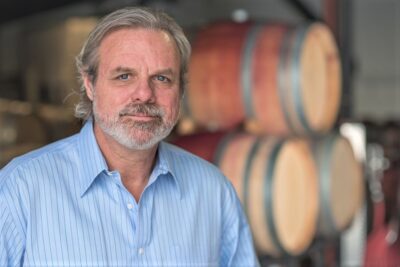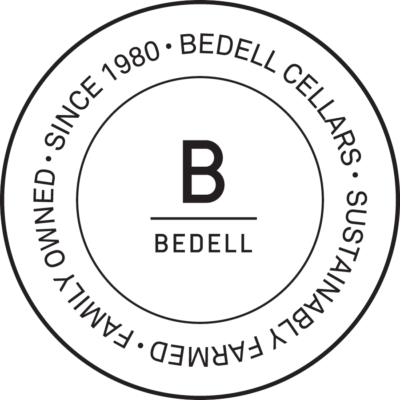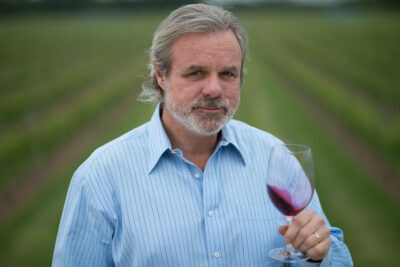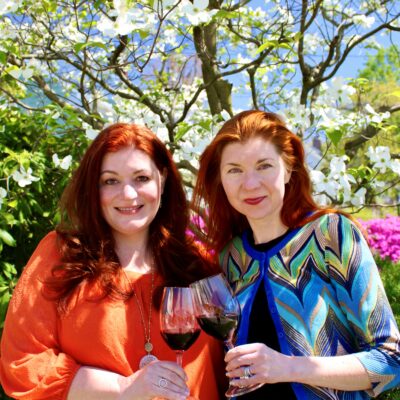 Rich Olsen-Harbich began pioneering sustainable winegrowing techniques decades before it was cool.
Rich Olsen-Harbich began pioneering sustainable winegrowing techniques decades before it was cool.
“This Sustainability Award really validates what we’ve been doing at Bedell Cellars since 1980,” Olsen-Harbich, winemaker at Bedell Cellars, notes. “Sustainability is a zero-sum game. It is a pathway that you walk on, without an end in sight. You always want to find a way to be even more sustainable.”
The New York Wine & Grape Foundation created the Unity Awards in 1990 to celebrate, recognize and encourage cooperation among grape growers, wineries, researchers, retailers and others who contribute to the advancement of this dynamic industry.
The Sustainability Award recognizes an organization or winery that has exemplified sustainable practices.
Olsen-Harbich is quick to say that he shares this award with many other people at Bedell and beyond.
A Movement With Many Parts and Participants
 “When Michael Lynne founded Bedell Cellars in 1980, he was committed to preserving the health of the water and land,” he says of the late founder, who died at age 77 in 2019. “We wouldn’t be here as a winery or a region without him. It has always been a sensitive area because we are on one of the largest tidal estuaries on the East Coast. Plus, we get our drinking water from aquifers. Agricultural pollution harms all of us.”
“When Michael Lynne founded Bedell Cellars in 1980, he was committed to preserving the health of the water and land,” he says of the late founder, who died at age 77 in 2019. “We wouldn’t be here as a winery or a region without him. It has always been a sensitive area because we are on one of the largest tidal estuaries on the East Coast. Plus, we get our drinking water from aquifers. Agricultural pollution harms all of us.”
Lynne’s passion, and the innate sense of decency among other growers and vintners in Long Island, helped ensure that the region became the first area of New York with a codified sustainable wine-farming system in place.
Olsen-Harbich—who is the North Fork’s longest-tenured vintner—says that over the decades, his and Bedell’s approach to sustainability has evolved.
“The tools we have, from a range of softer and more eco-friendly products in the vineyard to the machines we use, have become a lot more sophisticated over the years,” he explains. “And our understanding of different products’ potential effects on the water has also improved considerably.”
Olsen-Harbich was always eager to share his knowledge and research with fellow viticulturalists.
In 1984, he became the second president of the Long Island Grape Growers Association.Since 1995, Olsen-Harbich has been part of an advisory board for Cornell University’s Wine Grape Research program.
“It became increasingly clear that codifying what we were trying to do in terms of sustainability was important,” he says. “It would provide a clear plan to the growers who wanted to operate and farm sustainably, but didn’t know where to begin.”
There were discussions of a statewide sustainability certification program, but Olsen-Harbich says he and his fellow growers wanted to get something in place quickly.
Codifying Sustainability
 “By 2012, we were able to codify the Long Island Sustainable Winegrowing Alliance,” he says. “It was the first sustainability certificate on the East Coast, and it paved the way for others to follow. In many ways, it’s simple. It focuses on preserving natural resources and ensuring the viability of our terroir, with a minimal impact on the surrounding society and environment.”
“By 2012, we were able to codify the Long Island Sustainable Winegrowing Alliance,” he says. “It was the first sustainability certificate on the East Coast, and it paved the way for others to follow. In many ways, it’s simple. It focuses on preserving natural resources and ensuring the viability of our terroir, with a minimal impact on the surrounding society and environment.”
But in practice, there are more than 200 detailed ecological management best practices designed to significantly reduce inputs. When the program launched, five producers signed on. Today, there are 18 producers with vineyards encompassing 1,110 acres, or about half of the region’s acreage under vine.
Olsen-Harbich is bullish on the evolution of the notion of sustainability, especially as the statewide New York Sustainable Winegrowing certification goes into effect.
To be certified New York Sustainable, producers have to adopt practices that minimize environmental impacts, reduce economic risks and protect worker health and safety. They were designed, like the Long Island Sustainability standards, with the nuances of New York grape-growing in mind.
“It is so exciting to see how many New York wineries and vineyards are signing on for the certification,” he says. “And I also really appreciate the way it encompasses not just farming practices, but social practices. Sustainability should encompass not just farming and production, but the way we treat our employees and the economic health of our businesses and community.”
Sustainability is a journey. New York wouldn’t be as far along as it is without the wisdom and leadership of Olsen-Harbich.

